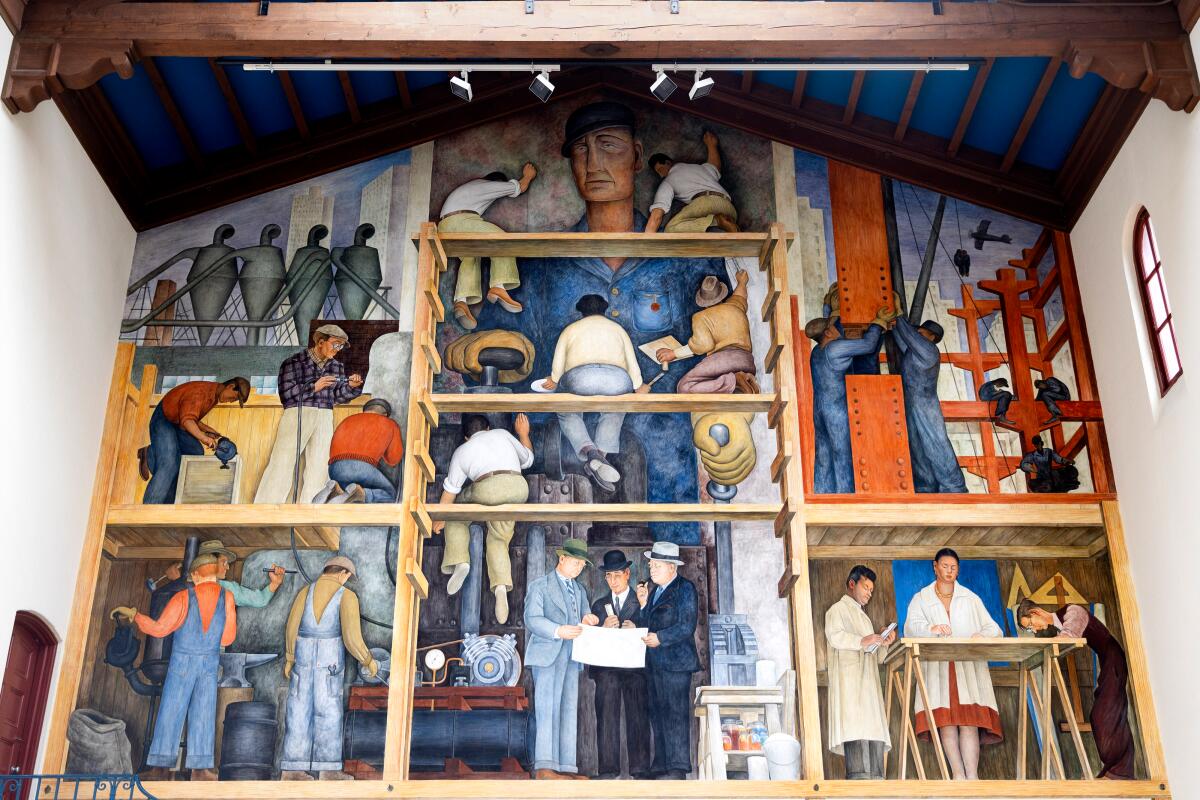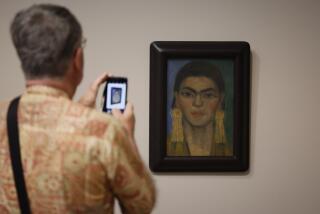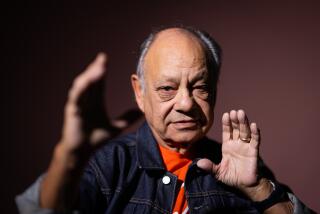For sale: San Francisco Art Institute campus, $50-million Diego Rivera mural included

The financially troubled San Francisco Art Institute has put its campus on sale, and the deal includes a building adorned by a multimillion-dollar mural by famed artist Diego Rivera.
Facing a debt of about $20 million, the school at one point considered selling Rivera’s “The Making of a Fresco Showing the Building of a City” by itself to stay afloat. But rumors that the mural could be moved out of the school and the city sparked outrage among artists, professors and city leaders. Worried that the artwork could leave San Francisco, faculty and city leaders pushed to keep it exactly where it sits.
Unable to meet its debts, however, SFAI filed for Chapter 7 bankruptcy protection on April 19, and on Tuesday, the real estate company Cushman & Wakefield announced it had been hired to sell the historic campus in San Francisco’s Russian Hill neighborhood, including Rivera’s 1931 mural.
Built in 1926, the campus includes more than 93,000 square feet in two buildings, along with the school’s iconic bell tower, courtyard, library, classrooms and galleries.
“This is a very special landmark property and will make an inspiring home for another education institution, museum or other creative/innovative use,” Tom Christian, executive managing director at Cushman & Wakefield, said in a statement.
The school has produced such creative arts luminaries as photographer Annie Leibovitz, director Kathryn Bigelow and painter Kehinde Wiley.
No price has been listed for the entire campus. The sale is expected to bring in a hefty sum, however, since the Rivera mural sitting inside one of the two buildings is estimated in the bankruptcy filings to be valued at $50 million, making it its most valuable asset.
The painting adorns the main wall of the institute’s Diego Rivera Gallery.
In the late 1920s, SFAI had sought to commission Rivera to travel to San Francisco and paint a mural, but the Mexican artist’s ties and communist ideology made it a challenge to obtain a visa.
In 1930, then-SFAI President William Gerstle helped Rivera obtain a visa and commissioned the work, which is considered a tribute to the industrial worker, according to SFAI.
The painting shows the construction of a city and the making of a fresco, and depicts the various types of people involved in the task, including manual laborers, engineers, artists and architects.
Staying true to his ideals of celebrating the worker, Rivera conspicuously placed construction workers, laborers and artists, with rolled-up sleeves and overalls, higher in the 74-foot-wide painting. The only men wearing suits, the rich and powerful, are placed at the bottom of the work. Rivera, with a brush and palette in hand, is seen off center of the painting with his back to the viewer.
An outsized depiction of a laborer in the mural has a red star on his breast pocket, suspiciously similar to a symbol of communism, but which Rivera insisted was a tobacco label.
When rumors began to surface that SFAI’s board of trustees was considering selling the mural, it sparked outrage among its faculty, who said in an open letter that selling and removing the mural would “damage the school’s reputation, legacy and position.”
“We believe that any sale of the mural resulting in its removal from the Chestnut campus is unconscionable, and we ask for your ideas and resources as we map ways to prevent it,” the union representing adjunct professors said in the letter. “We have a predominantly white and extremely affluent board that is seeking to protect its own wealth by selling the work of an artist of color to another white and incredibly powerful buyer.”
The “powerful buyer” mentioned by the professors was disclosed as filmmaker George Lucas, who had expressed interest in buying the mural for the Lucas Museum of Narrative Art under construction in Los Angeles, according to the New York Times.
“Keeping the mural in place is not just the ‘first choice’ — it’s the only choice,” San Francisco Board of Supervisors member Aaron Peskin said in a tweet.
In response, San Francisco supervisors in January 2021 designated the mural a city landmark, which would prevent it from being removed.
More to Read
Sign up for Essential California
The most important California stories and recommendations in your inbox every morning.
You may occasionally receive promotional content from the Los Angeles Times.











